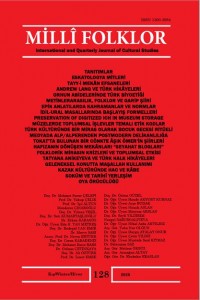Öz
Jonks, a collection of literary works kept by various people who are not necessarily the composers of those works, are the primary sources used in investigations of Turkish folk literature. Usually kept by literature enthusiasts, jonks are significant as they provide information on the folklore and literature of the period and as they include poems by previous ashiks who were folk poets. As they were not kept in any concerns or expectations, jonks provide clear and sincere information. Therefore, each and every jonk possesses great value when it is uncovered and translated. Because all the jonks currently registered in libraries are not translated so far and some are not registered yet, studies on folk poetry and literature are incomplete. While some jonks display the sect or cult of their keepers, most of them conclude that the poems they harbour appealed to the interest of contemporary readers and audience and that they stood the test of public criticism and became folklore. It is closely related to many elements such as those ashiks’ tone, means of expression, and lack of artificiality. Their poems were transcribed down to jonks in following centuries, which means that those poems were recited by later ashiks who imitated them as predecessors. The fact that earlier poems were recited by later generations of ashiks may also result from a master-apprentice relationship. However, the current knowledge on the formation of traditional ashik branches is not clear prior to 19th century. Therefore, it is not currently possible to tie the tradition of recitals to ashik branches with regards to poets before 19th century. On the other hand, jonks function as the source for those literary works outside the master-apprentice relationship. As some ashiks were wanderers, their poetry was known and recorded in many regions. However, some poems were recited centuries after their composer’s life and in the regions where the ashiks are known not to have visited. In addition to showing that an ashik is appreciated by the public, it is also related to the spread of oral tradition and its role on cultural transfusion.
Ashik Omer is one of the few folk poets who can be evaluated for these features. He is regarded among the best practitioners of ashik tradition whose poetry was knows in a vast territory second to Yunus Emre. Many of his poems are found in his dewan while some are only registered in jonks. New poems by Ashik Omer are discovered as new jonks are translated. This study focuses on four poems attributed to Ashik Omer which were uncovered in a jonk found in the private library of Hasan Erdem in Tokat province. Introductory information is provided about the jonk on which the poems are written. Therefore, the jonk in question is open to the interpretation of other scholars. Afterwards, the studies on Ashik Omer are mentioned. The main argument of the study comprises the comparison of the newly discovered four poems with the previous poems by Ashik Omer published earlier studies. Three of the poems attributed to Ashik Omer display his pseudonym. While the fourth poem lacks it, it is listed with a title as Ashik Omer. One of the four poems was published before in a paper. The remaining poems are published for the first time with this study.
Anahtar Kelimeler
Ashik Omer Jonk Ashik Tradition Oral and Written Culture Tokat
Kaynakça
- Büyükokutan Töret, Aslı. “Balıkesir’de Bulunan Bir Cönkte Âşık Ömer’in Şiirleri”. Motif Akademi Halkbilimi Dergisi, 27 (2019): 516-538.
- Elçin, Şükrü. Âşık Ömer. Ankara: Kültür Bakanlığı Yayınları, 1987.
- Ergun, Sadettin Nüzhet. Âşık Ömer Hayatı ve Şiirleri. İstanbul: Semih Lütfi Matbaa ve Kitabevi, 1935.
- Çavdar, Yıldıray. “Fransa Milli Kütüphanesindeki Cönklerde Âşık Ömer Adına Kayıtlı Şiirler”. SEFAD, 37 (2017): 387-406.
- Gökyay, Orhan Şaik. “Cönk”. Cilt 8. İstanbul: Türk Diyanet Vakfı, 1993:73-75.
- İbraev, Mirlan. “Aşık Ömer’in Taşkent’te Basılmış Divanı Üzerine Bir İnceleme”. Yüksek Lisans Tezi, İzmir: Ege Üniversitesi, 2007.
- Karasoy, Yakup ve Yavuz, Orhan. Âşık Ömer Divanı, İstanbul: Konya Büyükşehir Belediyesi Kültür Yayınları, 2015.
- Karasoy, Yakup ve Yavuz, Orhan. “Aşık Ömer Divanına Katkılar I”, TÜBAR, XLI (2017): 157-194.
- Kaya, Doğan. Türk Halk Edebiyatı Terimler Sözlüğü. Ankara: Akçağ Yayınları, 2007.
Öz
Anahtar Kelimeler
Âşık Ömer Cönk Âşıklık Geleneği Sözlü ve Yazılı Kültür Tokat
Kaynakça
- Büyükokutan Töret, Aslı. “Balıkesir’de Bulunan Bir Cönkte Âşık Ömer’in Şiirleri”. Motif Akademi Halkbilimi Dergisi, 27 (2019): 516-538.
- Elçin, Şükrü. Âşık Ömer. Ankara: Kültür Bakanlığı Yayınları, 1987.
- Ergun, Sadettin Nüzhet. Âşık Ömer Hayatı ve Şiirleri. İstanbul: Semih Lütfi Matbaa ve Kitabevi, 1935.
- Çavdar, Yıldıray. “Fransa Milli Kütüphanesindeki Cönklerde Âşık Ömer Adına Kayıtlı Şiirler”. SEFAD, 37 (2017): 387-406.
- Gökyay, Orhan Şaik. “Cönk”. Cilt 8. İstanbul: Türk Diyanet Vakfı, 1993:73-75.
- İbraev, Mirlan. “Aşık Ömer’in Taşkent’te Basılmış Divanı Üzerine Bir İnceleme”. Yüksek Lisans Tezi, İzmir: Ege Üniversitesi, 2007.
- Karasoy, Yakup ve Yavuz, Orhan. Âşık Ömer Divanı, İstanbul: Konya Büyükşehir Belediyesi Kültür Yayınları, 2015.
- Karasoy, Yakup ve Yavuz, Orhan. “Aşık Ömer Divanına Katkılar I”, TÜBAR, XLI (2017): 157-194.
- Kaya, Doğan. Türk Halk Edebiyatı Terimler Sözlüğü. Ankara: Akçağ Yayınları, 2007.
Ayrıntılar
| Birincil Dil | Türkçe |
|---|---|
| Konular | Türk Halk Bilimi |
| Bölüm | DERLEMELER |
| Yazarlar | |
| Yayımlanma Tarihi | 18 Aralık 2020 |
| Yayımlandığı Sayı | Yıl 2020 Cilt: 16 Sayı: 128 |



